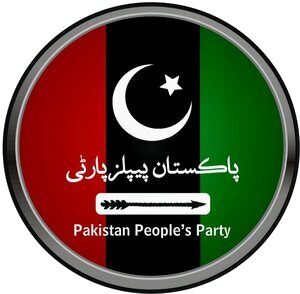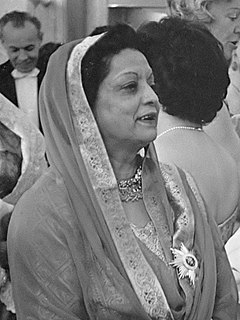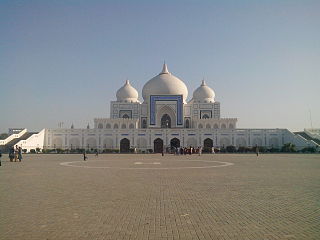
Benazir Bhutto was a Pakistani politician who served as the 11th and 13th prime minister of Pakistan from 1988 to 1990 and from 1993 to 1996. She was the first woman to head a democratic government in a Muslim majority country. Ideologically a liberal and a secularist, she chaired or co-chaired the Pakistan Peoples Party (PPP) from the early 1980s until her assassination in 2007.

Zulfikar Ali Bhutto was a Pakistani barrister and politician who served as the ninth Prime Minister of Pakistan from 1973 to 1977, and prior to that as the fourth President of Pakistan from 1971 to 1973. He was also the founder of the Pakistan People's Party (PPP) and served as its chairman until his execution in 1979.

The Pakistan Peoples Party is a centre-left, social-democratic political party in Pakistan. It is currently the third largest party in the National Assembly. The party was founded in 1967, when a number of prominent left-wing politicians in the country joined hands against the military dictatorship of President Ayub Khan, under the leadership of Zulfikar Ali Bhutto. Affiliated with Socialist International, the PPP's platform has formerly been socialist, and its stated priorities continue to include transforming Pakistan into a social-democratic state, promoting secular and egalitarian values, establishing social justice, and maintaining a strong military. The party, alongside the Pakistan Muslim League-Nawaz and the Pakistan Tehreek-e-Insaf is one of the 3 largest political parties of Pakistan.

Nasim Hasan Shah was a Pakistani jurist and served as Chief Justice of Pakistan. He is best known for his role in the verdict against Zulfiqar Ali Bhutto, the first democratically elected Prime Minister of Pakistan, which resulted in the death penalty.

Begum Ra'ana Liaqat Ali Khan was the First Lady of Pakistan from 1947 to 1951 as the wife of Liaquat Ali Khan who served as the 1st Prime Minister of Pakistan. She was also the first female and tenth governor of Sindh. She was one of the leading woman figures in the Pakistan Movement, and a career economist, and prominent stateswoman from the start of the cold war till the fall and the end of the cold war.

Begum Nusrat Bhutto was an Iranian-Pakistani public figure of Kurdish origin, who served as spouse of the Prime Minister of Pakistan between 1971 until the 1977 coup, and as a senior member of the federal cabinet between 1988 and 1990.
Bhutto is a Sindhi clan found in Sindh, Pakistan. The Bhutto's along with Bhatti's and other subclans are said to be a branch of the Bhati Rajputs.They have been settled in the area for over two centuries, having migrated to Sindh from Jaisalmer in India under Setho Khan Bhatti in the seventeenth century. According to other authors, the family migrated to Sindh from Sarsa in Hissar. The Bhutto family of Pakistan hails from this clan.
Stanley Wolpert was an American historian, Indologist, and author on the political and intellectual history of modern India and Pakistan and wrote fiction and nonfiction books on the topics. He taught at the University of California, Los Angeles (UCLA) from 1959–2002.

Khan Abdul Wali Khan was a British Indian and later Pakistani secular democratic socialist and Pashtun leader, and served as president of Awami National Party. Son of the prominent Pashtun nationalist leader Bacha Khan, Wali Khan was an activist and a writer against the British Raj like his father.
Mir Ghulam Murtaza Bhutto was a Pakistani politician and leader of al-Zulfiqar, a Pakistani left-wing militant organization. The son of Zulfikar Ali Bhutto, the former Prime Minister of Pakistan, he earned a bachelor's degree from the Harvard University and a master's degree from the University of Oxford. Murtaza founded al-Zulfiqar after his father was overthrown and executed in 1979 by the military regime of General Zia-ul-Haq. In 1981, he claimed responsibility for the murder of conservative politician Chaudhry Zahoor Elahi, and the hijacking of a Pakistan International Airlines airplane from Karachi, during which a hostage was killed. In exile in Afghanistan, Murtaza was sentenced to death in absentia by a military tribunal.

Abdul Hafeez Pirzada was a Pakistani lawyer, legal theorist, and politician, who served variously as minister for information, minister for law, minister for finance, and minister for education under president and later prime minister Zulfikar Ali Bhutto from 1971 to 1977. As law minister, he is credited as a principal draftsman of the Constitution of Pakistan, passed in 1973.
Mumtaz Ali Khan Bhutto, was a Pakistani politician who served as 8th Governor of Sindh and later the 13th Chief Minister of Sindh. He was also the first cousin of Zulfiqar Ali Bhutto, who was the Prime Minister of Pakistan from 1973 to 1977.

The Bhutto family is a prominent political family and among the most powerful families of Pakistan, based in the province of Sindh. Bhuttos have played a prominent role in Pakistani politics and government. The family has held the leadership of the Pakistan People's Party (PPP), since its inception in 1967. The Bhuttos are based in Sindh province. The Bhuttos have been settled in the area for over three centuries.
Kahuta is a census-designated city and tehsil in the Rawalpindi District of Punjab Province, Pakistan. The population of the Kahuta Tehsil is approximately 220,576 at the 2017 census. Kahuta is the home to the Kahuta Research Laboratories (KRL) which was founded to undertake the Kahuta Project as part of the atomic bomb project. Before the Kahuta Project, the site was occupied by retired officers of Pakistan Armed Forces and contained a small public community, including a private high school.
Wahid Baksh Bhutto was a landowner of Sindh, and an elected representative to the Central Legislative Assembly of India.

General Muhammad ShariffNI(m), SI(m), was a four-star rank army general in the Pakistan Army who was the first Chairman of Joint Chiefs of Staff Committee, serving in this post from 1976 until tendering his resignation in 1977 over the disagreement with the military takeover of the civilian government by the Pakistani military.

Mazar of Zulfikar Ali Bhutto is situated at Garhi Khuda Bakhsh, in Larkana District, Sindh, Pakistan.

Khan Amirzadah Khan was a Khudai Khidmatgar and a leader of the National Awami Party in Pakistan. He was born on 15 November 1918 in the house of Khan Khoidad Khan at Bakhshali village, Mardan District in the province of Khyber Pakhtunkhwa formerly known as North West Frontier Province Khyber Pakhtunkhwa. He was an active participant of Khudai Khidmatgar Organization of Great freedom fighter KHAN ABDUL GHAFFAR KHAN since his student life, Amirzada Khan started active politics with National Awami Party and remained President of National Awami Party District Mardan until 1972 when he remained senior Minister of the province(Provincial Minister of Law, Education and Parliamentary Affairs).
The family of head of state and government in Pakistan is an unofficial title for the family of the head of state or head of government of a country. In Pakistan, the term First Family usually refers to the head of state or head of government, and their immediate family which mostly comprises their spouse and their descendants. In the wider context, the First Family may comprise the head of state or head of government's parents, siblings and extended relatives.

The Delhi Agreement was a trilateral agreement signed between India, Pakistan and Bangladesh on 28 August 1973; and ratified only by India and Pakistan. It allowed the repatriation of prisoners of war and interned officials held in the three countries after the 1971 Bangladesh Liberation War. The agreement has been criticised for Pakistan's failure to repatriate Urdu-speakers in Bangladesh, not holding to account 195 senior military officials accused of breach of conduct during war and not making provision for a war crimes tribunal.












